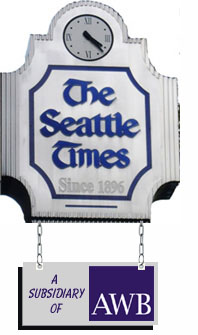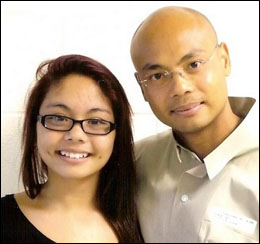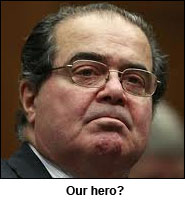NEWS ROUNDUP
McCleary clock, no dumping, Supreme threat…
Tuesday, May 27, 2014
STATE GOVERNMENT
► In today’s Olympian — Lawmakers running out of time (editorial) — McCleary v. State is like a high-stakes poker game at this point, with state lawmakers betting the court won’t hold them in contempt of court before they convene the 2015 Legislature, which will be a budget-making session with unparalleled challenges. Maybe lawmakers will dodge a bullet for the remainder of the year. But anyone who survives the election and reports to duty in 2015 knows that they have no choice but to make meaningful progress on a funding plan. Vague promises are no longer enough.
 ► In today’s Seattle Times — State Court of Appeals workers’ compensation ruling a signal for further reform (editorial) — The state Court of Appeals has finally issued a decision that gives a green light to workers’ compensation settlement agreements. So far, so good. But Washington’s law was such a weak-kneed thing in the first place that lawmakers ought to see the ruling as a signal for further reform.
► In today’s Seattle Times — State Court of Appeals workers’ compensation ruling a signal for further reform (editorial) — The state Court of Appeals has finally issued a decision that gives a green light to workers’ compensation settlement agreements. So far, so good. But Washington’s law was such a weak-kneed thing in the first place that lawmakers ought to see the ruling as a signal for further reform.
EDITOR’S NOTE — The Times has never been a fan of the safety net for injured workers. When the workers’ compensation system was first established more than 100 years ago, the Times wrote that it “places a burden upon the industries of this Commonwealth that will break many of them — entirely destroy the profits of others and will prevent new capital entering the state at all.” In the century since, the Times has continually argued for cutting the program’s benefits and in 2010, the Times endorsed privatizing the whole system, an idea soundly rejected by voters in every county of the state. So it should come as no surprise that they want more businesses to be able to play “Let’s Make a Deal” with vulnerable families during their times of crisis. The question is why? What motivated legislators to experiment with compromise-and-release settlements was low post-recession reserve funds. Those funds are recovering nicely without asking injured workers to settle for less.
► At PubliCola — One question for House Speaker Frank Chopp — Do you regret not moving Rep. Farrell’s minimum wage bill to the floor earlier this year? Says Chopp:
This year, we made real progress by passing the bill out of committee, and worked hard to gather the votes needed to pass the proposal from the House floor. Unfortunately the proposed plan did not have sufficient support to pass at that time. I support Rep. Farrell’s minimum wage bill and did not want to have it fail on the floor and hurt its long-term prospects of becoming law.
► In today’s Spokesman-Review — On state workers’ salaries, actions speak loudest (by Jim Camden) — Gov. Jay Inslee raised eyebrows — and some blood pressures — among some legislative Republicans and other conservatives last week with comments about state worker salaries on the eve of contract talks. Some suggested he was making a concession on wages before contract talks even started. Perhaps they would have liked him to suggest workers should get ready to swallow pay cuts or expect to be replaced by robots.
IMMIGRATION
 ► From KPLU — This man may be deported to Cambodia before he can give his brother a kidney — A man being held in the Northwest Detention Center in Tacoma could help save his brother’s life by giving him a kidney. But that won’t happen if the U.S. goes forward with plans to deport the man to Cambodia, a country he left as a baby. The case shines a light on what some consider the U.S.’s overly harsh deportation policies.
► From KPLU — This man may be deported to Cambodia before he can give his brother a kidney — A man being held in the Northwest Detention Center in Tacoma could help save his brother’s life by giving him a kidney. But that won’t happen if the U.S. goes forward with plans to deport the man to Cambodia, a country he left as a baby. The case shines a light on what some consider the U.S.’s overly harsh deportation policies.
► In the NY Times — Using jailed migrants as a pool of cheap labor — As the federal government cracks down on immigrants in the country illegally and forbids businesses to hire them, it is relying on tens of thousands of those immigrants each year to provide essential labor — usually for $1 a day or less — at the detention centers where they are held when caught by the authorities.
ELECTIONS
► In the News Tribune — A make-believe Democrat on the 31st District ballot (editorial) — Citizens of the 31st are being treated to a certified political dirty trick. Somebody thinks they are fools enough to believe that a conservative extremist – even by Republican standards – is a member of the liberal party.
AFFORDABLE CARE ACT
 ► In the NY Times — IRS bars employers from dumping workers onto health exchanges — Many employers had thought they could shift health costs to the government by sending their employees to a health insurance exchange with a tax-free contribution of cash to help pay premiums, but the Obama administration has squelched the idea in a new ruling. Such arrangements do not satisfy the health care law, the administration said, and employers may be subject to a tax penalty of $100 a day — or $36,500 a year — for each employee who goes into the individual marketplace. The ruling this month, by the Internal Revenue Service, blocks any wholesale move by employers to dump employees into the exchanges.
► In the NY Times — IRS bars employers from dumping workers onto health exchanges — Many employers had thought they could shift health costs to the government by sending their employees to a health insurance exchange with a tax-free contribution of cash to help pay premiums, but the Obama administration has squelched the idea in a new ruling. Such arrangements do not satisfy the health care law, the administration said, and employers may be subject to a tax penalty of $100 a day — or $36,500 a year — for each employee who goes into the individual marketplace. The ruling this month, by the Internal Revenue Service, blocks any wholesale move by employers to dump employees into the exchanges.
► From AP — Big health insurance rate hikes could be less common — The wild hikes in health insurance rates that blindsided many Americans in recent years may become less frequent because of the health care overhaul. Final rates for 2015 won’t be out for months, but early filings from insurers suggest price increases of 10 percent or more. That may sound like a lot, but rates have risen as much as 20 or 30 percent in recent years.
► In today’s NY Times — Health care cost-sharing works — up to a point — Would even more cost-sharing in the form of deductibles and co-pays lead to savings as significant as those already seen? Recent studies suggest not.
NATIONAL
► In today’s LA Times — Americans say big business better at creating jobs abroad than in U.S. — Americans have a dim view of big business, saying in a new poll that large U.S. corporations are much better at creating good jobs in foreign countries than at home. Results of a Gallup survey showed respondents have more confidence in small businesses than large ones as the economy continues to struggle to recover from the Great Recession.
► At Think Progress — Median CEO pay passes $10 million for first time — The median CEO pay package hit $10.5 million last year, cracking eight figures for the first time since the AP began calculating the statistic. The median compensation number rose by 8.8 percent from 2012 and has now climbed by more than 50 percent over the past four years. By contrast, average weekly wages for working Americans rose just 1.3 percent last year, the AP notes.
► At CNBC — Walmart’s biggest problem: Its customers — At the center of the discounter’s domestic woes is its appeal among shoppers who are facing stagnant wage growth and simply can’t afford to spend on discretionary items — or in some cases, food.
TODAY’S MUST-READ
 ► In Mother Jones — Will the Supreme Court kill public employee unions? — Forget Wisconsin Gov. Scott Walker and his fellow union-bashing governors. Forget the partisan Republican attacks on organized labor. The gravest threat today to public-employee unions — which represent cops, firefighters, prison guards, teachers, nurses, and other city and state workers — is a Supreme Court case named Harris v. Quinn, which could be decided as early as this Tuesday. And, strangely enough, it is the court’s most sharp-tongued conservative, Justice Antonin Scalia, who could ride to organized labor’s rescue.
► In Mother Jones — Will the Supreme Court kill public employee unions? — Forget Wisconsin Gov. Scott Walker and his fellow union-bashing governors. Forget the partisan Republican attacks on organized labor. The gravest threat today to public-employee unions — which represent cops, firefighters, prison guards, teachers, nurses, and other city and state workers — is a Supreme Court case named Harris v. Quinn, which could be decided as early as this Tuesday. And, strangely enough, it is the court’s most sharp-tongued conservative, Justice Antonin Scalia, who could ride to organized labor’s rescue.
The Stand posts links to Washington state and national news of interest every weekday morning by 10 a.m.





